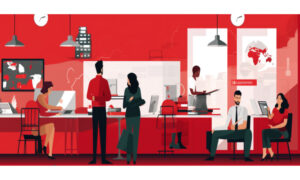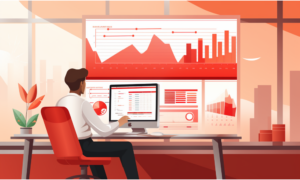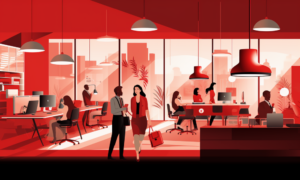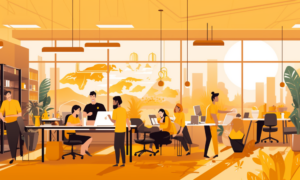Slack and Atlassian on disruption and the future of work
- 7 Min Read
This time of corporate disarray can be complex and daunting for leaders to cope with. But as in many scenarios, the major, fast-growing organizations can lead the way and set an example. With this in mind, HRD Connected tuned into a webinar with Slack and Atlassian to glean some authentic insight on how to react, pivot, adapt and thrive as an organization.
- Author: Sam Alberti
- Date published: Sep 3, 2020
- Categories

In a time of such unprecedented change and so many unknowns, it can be significantly challenging for businesses to respond in an appropriate manner.
The simple fact is that, even among the largest, most successful organizations and the brightest minds in business, no one has dealt with this before. As a result, it can feel like something of a guessing game.
What’s more, there is no single problem to be solved or question to be answered. Every aspect of a business – from supply chains, to product design, to internal communications, to company culture to employee benefits – must pivot accordingly, and do so without significantly damaging the success or growth of the organization.
However, as is the case in any scenario, drawing inspiration and guidance from your peers and contemporaries is a vital part of the learning process.
Slack and Atlassian, two of the world’s fastest growing technology companies, are both strong examples or organizations that have attacked the challenge, and pivoted successfully.
In a webinar that took place in August earlier this year, Stewart Butterfield (CEO & co-founder, Slack) and Mike Cannon-Brookes (CEO & co-founder Atlassian) discussed at length some of the issues they’ve faced during the pandemic, and how they overcame them.
To find out more, we attended the session and took note of some of the key learnings that HR and business leaders could apply in their own organizations.
What’s changed since the pandemic?
Cannon-Brookes began by acknowledging that every organization is different, and that his company had felt the affects of the pandemic in perhaps a slightly different way.
Atlassian is already a highly-distributed company, with 5,000 employees worldwide in 10 offices. In that sense, he explained, some of the changes were not so abrupt.
However, the company has experienced major changes in areas such as onboarding. Cannon-Brookes went on to explain that Atlassian hired roughly 120 people the week after transitioning to remote working.
In outlining how he has dealt with the changes, he said: “We’re all participating in the world’s largest telecommunications experiment to an extent.
“There’s no A/B test here. It just takes adaptability and resilience.”
Butterfield offered some similar sentiments; Slack are another organization that has been primarily remote prior to 2020.
However, he explained that the company has still had somewhat of a reliance on physical spaces, and lamented the loss of this privilege.
“For those who survive the pandemic, the common element is the loss of one of the tools they had to manage people: being in the same room,” he said. “We’ve definitely found this to be the case at Slack.”
How have Slack and Atlassian responded?
Cannon-Brookes echoed this in a sense, noting the importance of both physical and non-physical work spaces, and using Atlassian’s latest announcement as a prime example.
The company has recently unveiled its ‘Team Anywhere’ program, striking a middle-ground between remote and co-located working depending on the individuals.
He said: “We need to change where we work and how we work, and we need to separate these two concepts.
“Where you work is going to be up to you – we want to give some long-term certainty to employees in this regard. But how we work has to be standardized.
And Atlassian seems to be very much embracing this notion of becoming a hybrid organization, as it continues moves forward with plans for its new, $1bn office development in central Sydney.
“We will need to provide office spaces for some employees,” said Cannon-Brookes. “This is about choice and creating new norms. And besides, with the new building, we now have an opportunity to redesign what goes inside it.”
Butterfield concurred, explaining his take on why both co-located and remote working has a place in the future of Slack.
He said: “The office is a place to host customers, it’s a cultural touchdown, and it’s many other things as well. But we all know that there are less valuable and less productive elements of it.
“So, if we can reduce that, everyone will save money on offices. And I think there will be a much bigger emphasis on places where people come together to brainstorm or to plan work, and then go back to wherever they get their work done.”
What’s most important right now?
In addressing this question, both speakers were keen to talk about flexibility as a key theme, and how this will majorly factor into future plans for their organizations.
Butterfield said: “The main area of focus is giving Slack employees the flexibility they need. The more flexibility you have, the more productive you are as an employers and potentially the more productive you can be as an organization.
“If people are trying to jam work into times where they’re going to be less productive, then it’s no good for them and it’s no good for the company.”
Cannon-Brookes made a similar point but touched on the topic of trust as a key area.
“I think we need to be less declarative and more nurturing,” he said. “It’s about trusting employees to get the work they need to get done, done. It’s about teaching staff to manage their wellbeing and to create a sustainable level of work for everyone.”
But both went on to raise culture as a crucial ingredient at the present time, commenting on why it has been moving up the boardroom agenda, and how they have actioned this themselves.
Butterfield said: “There’s a lot of people who are impacted by this [COVID] in ways that are very challenging, and many who are relatively unaffected by it. So we’ve been ensuring that we are helpful and understand in whatever way is required.
“And in addition to what we’re doing to take care of them, we’re also creating opportunities for them to have significant accomplishments, and creating real value for them.”
Cannon-Brookes offered his take, explaining why surveying and keeping tabs on how employees are feeling is so important, and how this can help
He said: “We have a large CSR arm across the organization in general. The wellbeing and mental health pillars of this have never been more important, and we’ve really ramped up efforts there.
“It’s a really taxing and difficult period for people, and we’ve got to help them through it. You’ve got to start with a sense of vulnerability as a company to truly understand.”
Cannon-Brookes neatly summed up his take on culture by paraphrasing a poignant analogy: “If strategy is how you play a game of chess, culture is how you became a grandmaster.”
How can other organizations follow suit?
Finally, the pair went on to detail what they believe to be a successful formula for agility, and how organizations can implement this themselves.
Cannon-Brookes said: “You have to have a direction, but it’s okay to acknowledge that you don’t know how to get there – agile companies are always learning.
“You’re constantly reassessing – truly agile companies have a long-term direction, but they are always reassessing along the way. So for instance, we have no idea what’s going to happen in the next quarter.”
Butterfield supplemented these thoughts neatly, explaining that this open-ended approach is the best way forward.
“People still design business processes in a very top-down, rigid way, which makes it harder,” he said. “The very narrow definitions we give these things can result in a loss of adaptability.
“Never waste a crisis,” said Butterfield, offering some closing pieces of advice for leaders.
“These opportunities where you’re allowed to change things and be more experimental don’t come too often.”
Similarly, Cannon-Brookes said: “Remember, you probably already have the answers inside your business. Most organizations don’t do anywhere near enough to unlock the power of the people they already have.
“Perhaps the best thing you can do is just be honest and said: ‘we don’t know how to handle this right now’.”









